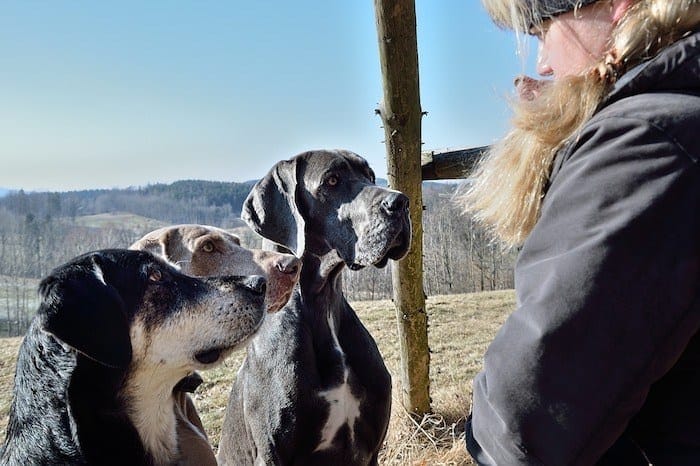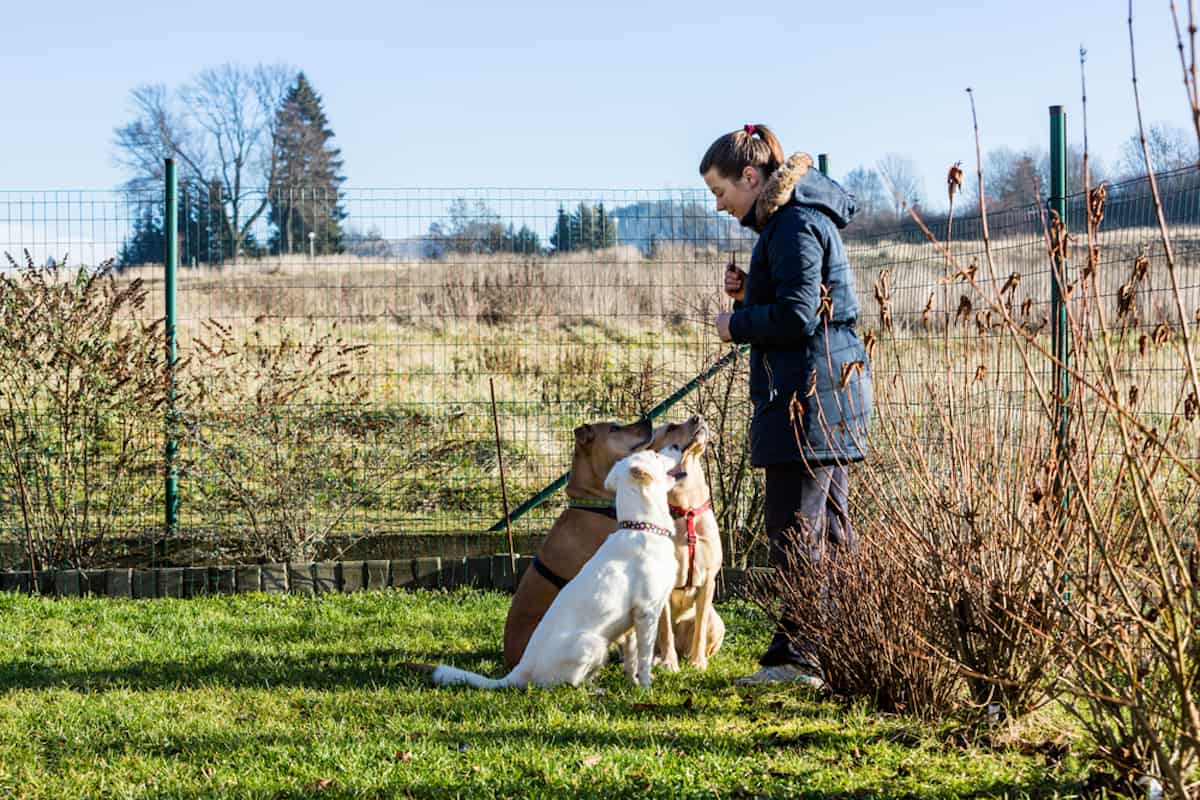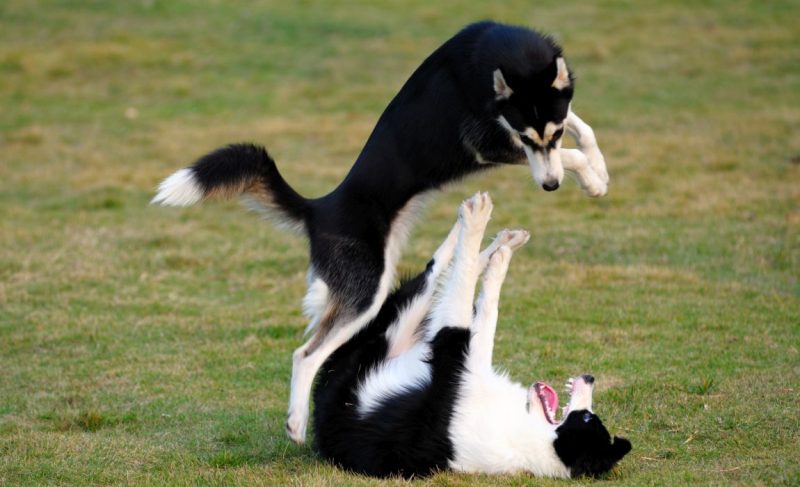Did you know that it’s legal for someone with a history of criminal animal abuse to be a dog trainer in many states? In states as varied as California, Oklahoma, Florida, and Connecticut, dog trainers have been accused of or convicted of animal abuse.
These are the very people we trust to care for our dogs. To teach our dogs how to be our best friends. And yet they’ve been accused of abusing our beloved pets, and many of them escape with no legal ramifications.
The sad truth is this: there are almost no regulations surrounding the dog training profession in the United States. While you need to have a license in most states to be a hairstylist, no state has similar requirements for becoming a dog trainer.
This means that it’s extremely important to know how to pick a good, knowledgeable, and trustworthy dog trainer. As someone who’s been in the dog training industry since 2012, I have a good handle on the field and how to pick a good dog trainer.
I’ll take you through the steps that I use when finding a trainer for friends or family if I can’t take them on as a client myself.
Pre-Screen Your Dog Trainer Using Professional Memberships
You already see why it’s so important to take a bit of time and pick a good dog trainer. You don’t want your dog beaten with a bat (like a dog at a training facility in Bothell, WA was) or shoved through a wall (like a dog at a training facility in Loveland, CO was) in the name of “training.”
You want someone who really knows how to teach your dog to behave. Ideally, someone who can do that quickly, effectively, and without fear, pain, or coercion.
A quick Google search in most cities will result in pages and pages of dog trainers (probably because literally anyone can call themselves a dog trainer, so there are plenty of “options”).

Luckily, there are some fantastic ways to pre-screen trainers without even getting on the phone. Your exact search process will vary slightly based on what you’re looking for. Do you need a puppy kindergarten group class, group obedience, private training for a specialized goal, or private behavior modification for a concerning problem?
Although there are no licensing requirements for trainers, there are several organizations that offer certifications for dog trainers. I always start with their directories (but that’s not where the search ends).
Here are a few of my favorite organizations that certify trainers:
- International Association of Animal Behavior Consultants (IAABC): This organization is, hands down, the most challenging organization to join. At the Certified Dog Behavior Consultant level, members must pass an exam, write case studies, collect references from vets and clients, have over 500 hours of in-person training, over 400 hours of coursework, and write discussions and recommendations for four example cases. One Certified Dog Behavior Consultant described the application process as “as rigorous as my master’s thesis.” I’m in the midst of the application myself, and I have to agree.
Members must adhere to the least intrusive, minimally aversive training methods, the industry standard for good care. Members must keep up with rigorous continuing education requirements and are given the opportunity to brainstorm with a network of behavior consultants and veterinary behaviorists. If your dog has any behavioral issues, this is the place to go.
- Certification Council for Professional Dog Trainers Directory (CCPDT): This organization offers three different levels of certification, depending on your needs. CPDT-KA trainers pass a multiple choice exam and have 300+ hours of experience. CPDT-KSA trainers pass the same requirements and pass a skills-based assessment from an evaluator.
Finally, CBCC-KA is a certification for dog behavior modification and dog behavior counseling — though this test is far less rigorous than the vetting that the International Association of Animal Behavior Consultants puts its trainers through.
CCPDT members are committed to positive reinforcement based training and keeping up with continuing education.
- Karen Pryor Academy Directory (KPA): These trainers are graduates of a professional mentorship program. They’re skilled in positive reinforcement training, can customize training plans, and keep their knowledge up to snuff with continuing education. You can read more about their qualifications here. They’re generally great for all-around obedience and skills training, but may be a bit “greener” than a trainer who is also a member of a professional certification organization.
- Veterinary Behaviorists (VB): This is the real deal, folks. You do not need a veterinary behaviorist if your dog needs training. However, if your dog is over-the-top anxious, fearful, or aggressive, this is the place to go. Veterinary Behaviorists have a ridiculous amount of school and practical experience under their belts. They also have the ability to prescribe behavioral mediation and are excellent at resolving the most complicated cases out there.
There are two other programs that are widely recognized in the industry that you might want to check out if there are no options from the list above. I didn’t include them in the list above because I have reservations about them.
The first is the Association for Professional Dog Trainers (APDT). This organization is large and well-regarded. Trainers also pledge to adhere to the least intrusive, minimally aversive training methodologies (they just agreed to an exciting joint statement with the IAABC and CCPDT). However, as I researched this article, I couldn’t figure out what qualifies someone to be an APDT member. So I decided to “join.”
I selected the Premium Professional Membership, the highest level membership. I confirmed my email and was asked to pay. That’s. It. Not exactly a great vetting process! I’m not impressed, and I’m not recommending this organization for that reason. That said, APDT members are probably a good place to start if you don’t have other trainers in your area from CCPDT, KPA, or IAABC.
The second almost-great organization is the Pet Professional Guild (PPG). While this organization has excellent goals (no pain, no force, no fear), the organization has been known to pit itself against other organizations when others have attempted to agree on admirable joint standards.
PPG trainers generally align with the ethics that I urge for dog trainers, but the membership application is far too simple and does not necessarily reflect a level of skill that I like to see in trainers. Like the APDT, the requirements for joining are simply too low for me to unilaterally recommend PPG trainers.
What If There Aren’t Any Accredited Dog Trainers Near Me?
I get it. I grew up in Ashland, Wisconsin, a town of just about 6,000. We were four hours from Minneapolis, seven hours from Madison, and about ten hours from Canada. Believe me, there were no good dog trainers in the area (there still aren’t, as far as I know).
If there are no certified trainers nearby, are you on your own with nothing but books, podcasts, and Youtube videos?
Not necessarily!
We live in the 21st century, which means you have the whole internet at your disposal. For those of us who like the accountability and support of a course, here are some of the best of the best:
- Puppy start right online resources. Not a course per se, Ian Dunbar’s library gives you almost literally everything you could ever want (and more) for raising and training a perfect canine companion.
- Separation anxiety help. This “Mission Possible” offering takes separation anxiety online, giving you access to world-acclaimed trainers from anywhere with an internet connection.
- Family dog and (kids and dogs). This course helps get the whole family on track and is perfect for busy families that want to ensure the kids and dogs get along well.
- Dog sports and other group classes. I’ve taken a few Fenzi classes, and they’re fantastic. They give you access to sports you’d never find in your tiny hometown as well as issue-specific group classes such as reducing noise phobias. They can be a bit dry, but the community is amazing.
- Virtual behavior modification training. I have to plug my own business, where I offer monthly email subscription packages and one-time video training lessons. Whether you’d like to have a trainer in your pocket to get help with ongoing behavior issues or you’d like a one-on-one demonstration and training plan, I’m here for you.
Many other trainers now offer remote-friendly behavior consultations. If you’d like to go the private training route, just skim through the IAABC or CCPDT listings and find a trainer who you like. Then check to see if they offer remote training (or ask if they’d consider it).
Now you’ve got a good list of potential trainers, it’s time to narrow down the options.

How Much Does a Dog Trainer Cost?
Dog training prices vary quite a bit depending on where you are in the country and what sort of service you need.
Paradoxically, I’ve found that some of the worst “crank-and-yank” trainers actually charge the highest rates. In fact, many of the most angry customers that I’ve ever seen had spent a fortune on a trainer who then proceeded to essentially abuse their dog until their dog “behaved.”
Let’s look at a few broad categorizations, ranked from cheapest to most expensive. I’m not going to give exact prices, but rather ballparks based on my experience.
- Print or online resources. Ranging from free training YouTube videos and free blogs to relatively inexpensive books or mini-courses, there are tons of resources available online or in print that are very budget-friendly. You often can get an expert opinion on your dog’s specific issue for under $15 if you purchase the right book or check the right free blogs!
- Online courses. Online classes aren’t always cheap, but in general you can purchase pre-recorded videos and training plans for very little (under $100). That’s because once the trainer has created this material, it may be in her best interest to sell more at a lower cost rather than to charge a huge amount and sell very few. You can check out our top picks for online courses here or check out our own course – 30 Things to Teach Your Dog in 30 Days!
- Remote private training. Some trainers offer private, one-on-one training over video chat. Some trainers heavily discount this thanks to the time and travel savings, while others keep their prices the same because they’re sharing the same amount of knowledge and education. Prices range from $20/hr to over $200/hr.
- Group classes. Of the in-person options, group classes are often cheapest. Group classes may not be good for fixing separation anxiety (that’s not an obedience issue but more of a panic disorder) or aggression (unless it’s a feisty fido or reactive rover class), but they’re excellent for basic skills and obedience and sports. Some areas also offer free puppy socials! Be sure to be just as curious about a group class trainer’s education as you would be for a private trainer — just because PetSmart training classes are the cheapest doesn’t mean they’re the right way to go. Most group classes are several weeks long and run from $100-$300, though some areas might find higher or lower prices.
- Private Training. Private obedience training generally is a touch cheaper than private behavior consulting, but often not by much. Private trainers may charge extra for specific issues (service dog training versus basic puppy skills) or charge a travel fee. Private training generally will cost between $50 and $100 per hour.
- Day Training. Some trainers will charge slightly less to come to your home and train your dog while you’re away at work. When I offered this service, I charged less because it was a bit lower-stress. No one had any problems if I was 15 minutes late! That factor alone was worth a discount to me. Many trainers do not offer this service, so it might be hard to find. A similar service is a daycare plus boarding facility. In this setup, you drop your dog off and your dog gets training during the day. Each of these day training options may cost between $50 and $200 per day — quite the range!
- Board-and-Train. We touch on board-and-train more in-depth towards the end of this article. This is often one of the most expensive ways to train your dog, but it’s obviously quite attractive for those of us who have more money than time or skill. Board-and-trains often cost upwards of $100 per day with minimum stays of two to four weeks. Most board-and-train stays will cost well into the thousands of dollars. Proceed with caution with this option, since it’s so expensive and the trainer accountability is quite low.
- Behavior Consultants. Like private trainers, behavior consultants meet one-on-one to help with your dog. However, behavior consultants generally specifically tackle behavior concerns like aggression and anxiety. They may also charge travel fees or have a sliding scale based on the concern at hand (aggression, a more common issue, may cost more than unique phobias). Some behavior consultants sell discounted packages to offset the cost. Most behavior consultants charge upwards of $80 per hour, though most charge less than $200 per hour.
- Veterinary Behaviorists. If you are seeing a veterinary behaviorist, two things are likely true about your situation: your dog is uniquely complicated and you’re are especially dedicated to her success. Veterinary behaviorists often charge upwards of $200 per hour, but they are far more educated in behavioral medications and other complicated issues than anyone else out there.
Depending on your budget and your specific concern, you might want to start with a lower-cost option. Keep in mind that cheaper group classes might not offer the same expertise — and that the highest price tag doesn’t always mean the most expertise.
Try to base your choice of a trainer on her education and skill level, not her price tag. The same goes for print and online resources, which is why I gravitate towards Dr. Ian Dunbar and Dr. Sophia Yin for online advice rather than a charismatic YouTuber.
Examine Your Prospective Dog Trainer’s Website
You’ve done your trainer directory search, and if you’re lucky, you’re staring at a list of 10+ trainers. How do you narrow them down?
Pull up a few of your trainer candidate’s websites and start poking around. Most trainers with a certification are pretty darn good, but it’s totally possible to pass an exam and still be iffy (look at all of those terrifying drivers out there who undoubtedly passed a driver’s license exam).
When I’m examining a trainer’s website, I look for:
- A clear explanation of their training methods. If a trainer doesn’t say how they train, I skip them. If a trainer talks about alpha, pack leader, dominance, calm/assertive energy, or even leadership, they’re out. This might be under a separate page, on the “about us” page, or somewhere on the home page.
- Positive, science-based training methods. I’m looking for science-based, positive reinforcement based trainers. I steer clear of trainers that rely on corrections, prong collars, e-collars, or pinch collars for training, always (yes, even in aggression cases). Trainers should be using food to pay dogs, not just praise or petting. No food, no money – don’t pay a trainer who won’t pay your dog (or worse, is going to hurt or scare your dog when he messes up).
- All of the organizations I’ve recommended above adhere to the Least Intrusive, Minimally Aversive training philosophy. Additionally, most good trainers will be familiar with the Humane Hierarchy. You can read all about why good trainers avoid correction-based training here.
- Pictures of happy, relaxed dogs. If most of the dogs have tight ears pinned back to their heads, wide eyes, or lowered posture, I’m out. That’s why I don’t recommend Doggy Dan’s online course! All of his dogs looked incredibly stressed and nervous. Look for canine calming signals, and be skeptical of a trainer if many of their “live action” training photos include stressed-looking dogs.
- Certification. Since you already found these trainers on the organization’s site, you already know they’re certified with a professional organization. If you found the trainer using Google or Yelp, check for those certifications and be highly skeptical if they lack a certification.
- Mention of your dog’s specific issue as an area of expertise. You don’t want to pay an obedience trainer to resolve your dog’s separation anxiety, or an aggression specialist to train your service dog. Obedience trainers excel at teaching precise skills and putting those skills on cue, but that is not what you need if your dog has anxiety or aggression issues! A behavior consultant is skilled in changing your dog’s motivations, emotions, and responses, which an obedience trainer may not be able to do. I gravitate towards trainers that specialize or niche down, rather than the uber-generalists. This means you’re really getting the trainer for your issue in your area.
It never hurts to do a quick Google, Facebook, or Yelp search of the business. Expect a few negative reviews, but be sure that the trainer is mostly highly regarded. Run away at any mention of corrections, anything that could be abuse, or other highly unprofessional reviews.
Most trainers who are part of the IAABC, KPA, or CCPDT will pass this bar. Honestly, if you’ve made it this far, they’re probably fantastic. But if you really want to go above and beyond, hop on the phone and interview your prospective trainer.
The Final Step: Interviewing Your Prospective Trainer + Questions to Ask
You like the look of the website and the info you’ve got. The trainer is a member of the right organizations, and you’re feeling good about the candidate. Hop on the phone with the trainer (or shoot them an email if you’re that type).
Here’s a sample email to send a prospective trainer. Use this as a phone script or copy and paste it to send to a prospective trainer — it’s yours!
Hello [trainer’s name],
My name is [your name] and I am interested in getting help with [dog’s name], a [age, breed]. We are having some trouble with [behavior problem or training goal] and would like some help.
I found you on the [directory] website, but I’d like to ask a few questions before hiring you.
- What happens to my dog if he gets something wrong in a training session?
- What happens when my dog gets it right?
- What do you offer as support between training sessions?
- Can you tell me about any dogs you’ve worked with that were similar to [dog’s name]?
I really appreciate your time and response.
Best,
[your name]
In this conversation, you’re looking for a trainer who quickly, easily, and confidently answers each question. You want to get the sense that they’re a capable professional. You also want to end the conversation feeling like you enjoyed talking to this person – after all, you’ll be spending a lot of time with them, so hopefully they’ll be some personality mesh too.
More than that, though, you’re looking for responses along the lines of:
- If your dog gets it wrong, we’ll reassess our setup and see if we can make it easier for him next time. We won’t be giving corrections.
- If your dog gets it right, we’ll reward him with something he really enjoys, such as food or a game of tug.
Your desired answers to #3 and #4 are more personal, depending on your needs and your preferences.
You might also want to ask about price and length of expected training, but do not expect a firm answer or steadfast guarantee. In fact, most organizations actually forbid trainers from making guarantees because outcomes in dog training are so difficult to ensure. Guarantees are the sign of a sleazy salesperson, not a skilled trainer (the same is true for breeders too).
Going Forward With Your Dog Trainer: Establish a Good Relationship
Hurrah, you’ve selected a trainer and it’s time to get started!
Throughout the course of your training sessions, you should always feel comfortable with your trainer. If you see your trainer interacting with you, your dog, or your family in a way that makes you uncomfortable, bring it up. If it continues to happen, look elsewhere. You can always go to a remote-based trainer if you have no other local options.
Unless your dog is seeing the trainer for stranger-directed fear or aggression, your dog should be excited about training sessions. If you see your dog lowering his posture, pulling his ears back, or grimacing by pulling his lips back with a closed mouth, listen to your dog. Find a different trainer.
That said, if your dog needs training because he’s not friendly with trainers, that’s not a good benchmark! Your trainer should be making some amount of headway in building a good relationship with your dog regardless, but this might be slow. I always applaud the use of basket muzzles when trainers are working with dogs that might bite.
Above all, working with a trainer should feel good. The trainer should support you, be your cheerleader, and explain things in an understandable way. If you or your dog is confused, belittled, or intimidated by your trainer, something is wrong. Go elsewhere with your money and your best friend.
A Quick Note on Doggie Boot Camps
I’ll close with a quick note about board-and-train programs (doggie boot camps). Most of the worst dog training horror stories I’ve ever heard have come from board-and-train programs.
In fact, the only time I’ve regretted referring a client out was when that client asked for board-and-train services. That dog ended up more afraid of people at the end of his stay, not less. Something went very wrong.
The problem with board-and-train programs is that you can’t see what the trainer is up to. If you really trust the trainer, going with the doggy boot camp route is fine.
But if the trainer is all talk and no skill (or worse, says the right things but actually uses force, fear, and coercion in the name of training), you might not realize that something is off until your dog is traumatized.
Canine boot camps aren’t terrible across the board — some board-and-train programs are fantastic. I’ve heard of trainers that keep a private photo diary online for you to view and see your dog’s progress (along with short explainer text). Brilliant! Expect and require updates.
All good board-and-train programs will also include handoff sessions where you learn how to “drive” your new dog and his skills. If you’re just handed the leash and a bill, you’ve been duped.
Hold your board-and-train trainers to the same stringent requirements as an in-person trainer, and then some.
How did you find your dream dog trainer? We’d love to hear what brought the two of you together!








Leave a Comment